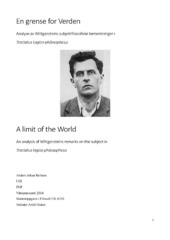En Grense for Verden. Analyse av Wittgensteins subjektfilosofiske bemerkninger i Tractatus Logico-philosophicus
Master thesis
Permanent lenke
https://hdl.handle.net/1956/8433Utgivelsesdato
2014-05-15Metadata
Vis full innførselSamlinger
- Department of Philosophy [240]
Sammendrag
Denne avhandlingen ønsker å belyse en obskur og dermed oversett del av Tractatus, delene som omhandler subjektet. Mange spørsmål melder seg i forhold til dette subjektet, som hvordan er disse knyttet til den språkfilosofiske delen av Tractatus? Hvordan skal vi tolke solipsismen vi finner i Tractatus? Hvilke styrker og svakheter er det i Wittgensteins tilnærming til subjektet? For å forsøke å besvare noen av de spørsmålene har jeg delt avhandlingen i to hoveddeler. Den første delen er dedikert til språkfilosofien i Tractatus, den andre delen til subjektet i Tractatus. Denne inndelingen gjør oss i stand til å se hvordan de subjektfilosofiske bemerkningene er knyttet til språkfilosofien. Den kan også vise oss hvorfor den stilen bemerkningene har er som den er. Hovedtemaet i Tractatus er å avgjøre hva vi kan si og om hva vi må tie. Det som kan sies kan sies klart. Men det er en hel del ting som ikke kan sies klart, det er ting som viser seg i språket. Hva som viser seg er trekk ved livet som vi ikke kan formulere i velformede setninger. Blant disse trekkene er logikk, etikk og det filosofiske subjektet This text seeks to shed some light on a rather obscure and hence overlooked part of the Tractatus; the sections that deals with the subject. There are many questions regarding these sections, like how is it connected with the logical and semantical parts of the Tractatus? How is the solipsism we find in the Tractatus supposed to be interpreted and understood? What are the strengths and weaknesses of Wittgensteins approach to the subject? To try and answer some of the many questions that these sections provoke I have divided the text into two main parts, where the first part is dedicatet to the philosophy of language we find in the Tractatus. The second part is dedicatet to the subject and the sections of the Tractatus wich are relevant for analysis of the remarks about the philosophical subject. This allows us to see how the logical and semantical sections of the Tractatus are connected with the remarks on the subject. It also shows us why the style of these remarks are as they are. The main theme in the Tractatus is the question of what we can say and about what we must remain silent. Wittgenstein says that what can be said can be said clearly, but there are a whole lot of things that cant be said clearly, but rather shows itself in language. What shows itself is features of life that we can't formulate in well formed sentences that have a truth value. Amongst these features are logic, ethics and the philosophical self.
